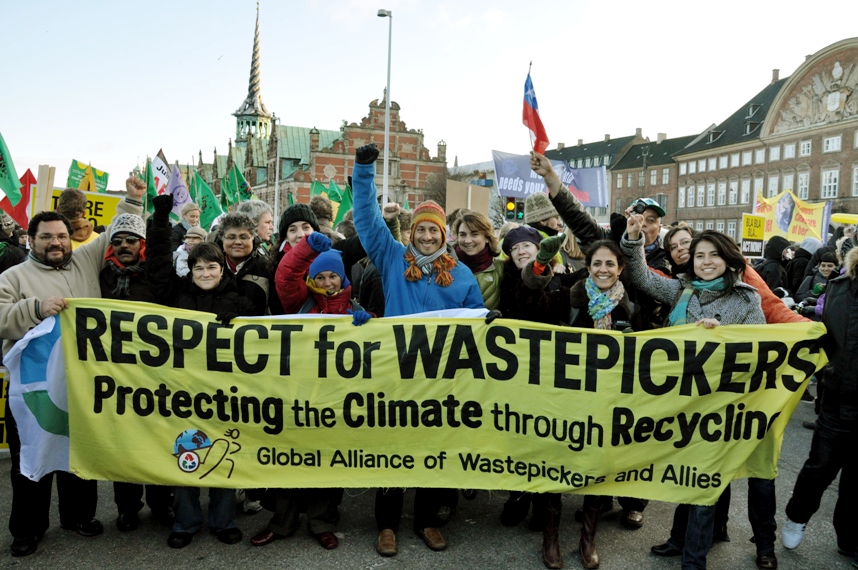The Global Alliance of Waste Pickers, together with WIEGO, Green Partners, ICCCAD and Resilience Hub brought waste pickers and allies from around the world to present on the ways that waste pickers mitigate and adapt to climate change. WIEGO and the Global Alliance of Waste Pickers also launched their greenhouse gas emissions calculator, which was developed by Green Partners. The calculator can be found at: www.wiego.org/ghg
Every kilo in the hands of a recycler means less pollution.
This was one of the powerful messages from representatives of the Global Alliance of Waste Pickers to the Glasgow COP. No one could say they haven’t been vocal in their promotion of the benefits of independent waste collection nor their demands to be taken seriously as a force for good. They have, after all, been lobbying at COPs since at least 2010.
This time three leaders of the waste picking movement recorded short videos that bubbled with frustration at society’s lack of support for their work and their welfare.
GlobalRec, the umbrella group that supports waste pickers worldwide, presented the case for the thousands of people who do their best to make a living from, mostly, unofficial collection and recycling. The session was titled Saving the Climate – Waste Pickers Contribution for a Cleaner Planet.
It was Samuel le Coeur, president and founder of l’association l’Amelio who said there were 5000 people working on collecting, flea markets and scrap metal around Paris. ‘Every kilo in the hands of a recycler means less pollution,’ he said. Despite harassment by the Paris authorities, he said Amelio had in some places gained the right to work and had established sites. But he was scornful of the policies of incinerating rather than recycling rubbish which he said created more pollution.
From Bangalore, India Krishna said that every week he and his fellow pickers went to 15,000 houses door to door collecting material and then segregating it. He was particularly concerned by the wasteful attitude to clothing which he said required a lot of resources to manufacture – electricity, water and chemicals -and to recycle. He said consumers were far too eager to throw away perfectly good clothes just because they were old or out of fashion.
He said working conditions were poor and he made a plea for a factory to be built by the city of Bangalore to be run by the waste pickers who were the best people to understand the problems and find solutions.
For Rina Begum, president of the Bangladesh Waste Pickers Union, climate change was already imperilling the livelihoods of the 2500 people living on the site of the Matuail Dump. She used to work all year round but now ‘rain comes any time. Waste mixes with rain waters and we cannot work.’ Now the Dhaka city corporation is planning to generate electricity through incinerating waste, further undermining an already fragile existence.
Picture: Waste pickers have been campaigning at Cop for years. This was a rally in their support in Copenhagen in 2010
Watch the videos here:

